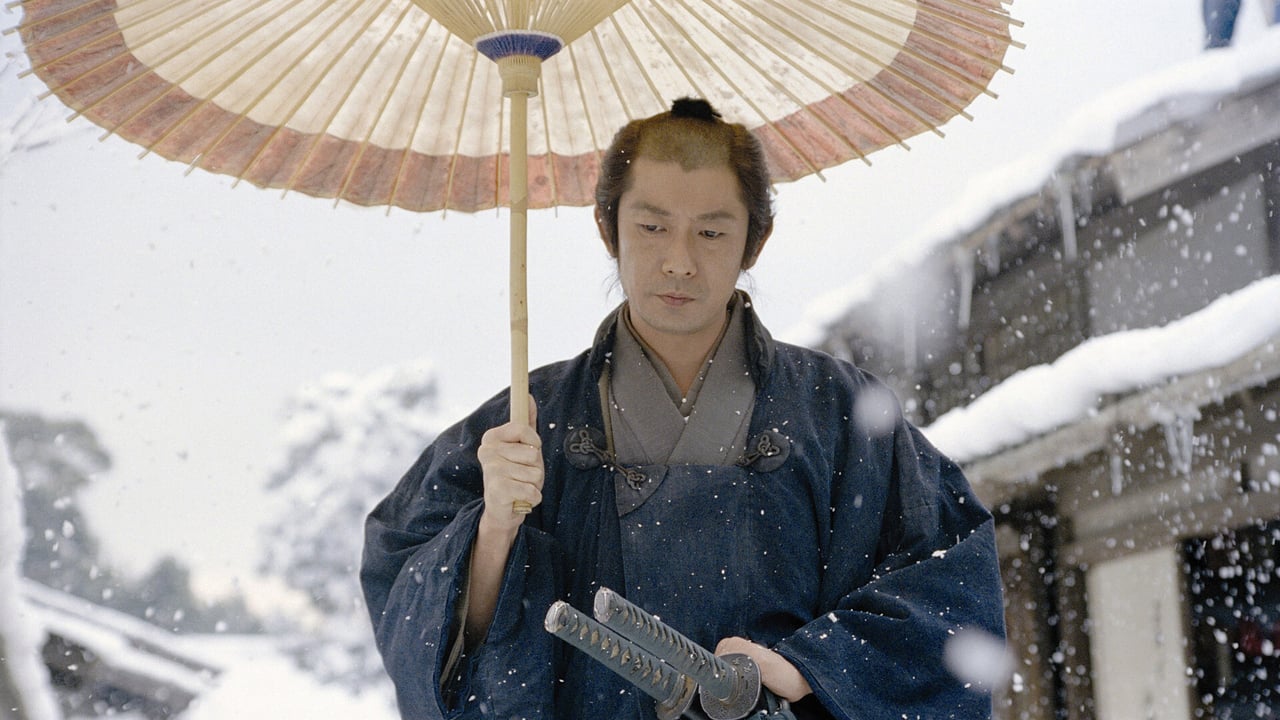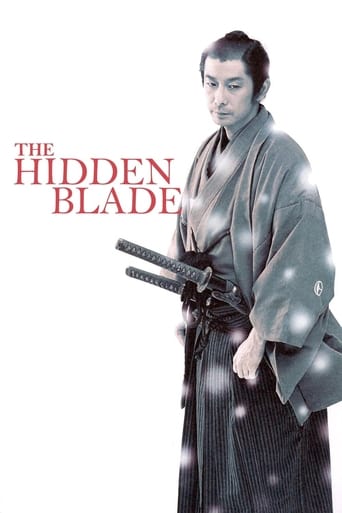SeeQuant
Blending excellent reporting and strong storytelling, this is a disturbing film truly stranger than fiction
Nicole
I enjoyed watching this film and would recommend other to give it a try , (as I am) but this movie, although enjoyable to watch due to the better than average acting fails to add anything new to its storyline that is all too familiar to these types of movies.
Aspen Orson
There is definitely an excellent idea hidden in the background of the film. Unfortunately, it's difficult to find it.
Haven Kaycee
It is encouraging that the film ends so strongly.Otherwise, it wouldn't have been a particularly memorable film
danielnquinn
And I've seen a few. A film revolving around the advent of artillery warfare and the outmoding of the Samurai shogunite, directed with nostalgia and passion, against the backdrop of feudal Japan, fixed in it's ideas of honour and duty, makes this film a true depiction of 19th century Japan.The love story aside, which is a real and understandable love, the film is more central to the beliefs Japan held on to for 500 years that suddenly and devastatingly became untenable, and yet the honour remains.See this film. Brilliant in every regard.
dromasca
'The Hidden Blade' does not reach the picks of beauty and does not fascinate like other samurai films, but is a solid, well filmed and well told story worth watching. The period when the action happens is the same one where 'The Last Samurai' is located, the time when Japan underwent rapid transformation and opening to the Western culture and way of life, but the angle is the one of the traditional samurai world. Like in the more famous movie the centuries old code of honor of the samurais enters in conflict with the rapid pace of change of the society around, but this conflict takes a secondary role here.It is actually the old code of honor that motivates Munezo, the principal character and which prevents him to consume his love to the servant Kie who belongs to another social class, and leads him into a life and death fight with his old friend who revolted against the stagnating system. The moral value of the code prevails and saves eventually the heroes in a kind of happy end, not unexpected, but yet well desired by audiences who identified with the heroes. The film is well acted and uses less the high tomes and interjections that sometimes discourage the Western audiences watching Japanese movies. The cinematography is consistent in approach and dominated by balanced nuances of brown and yellow. Without daring too much 'The Hidden Blade' is a well told story and should not be avoided by fans of Japanese films, or even as plain entertainment.
noralee
"The Hidden Blade (Kakushi-ken: oni no tsume)" is filmed in a deceptively old-fashioned and leisurely style to make pointed observations of Japanese society, much as "Far From Heaven" did for the U.S. Director/co-writer Yôji Yamada again adapts Shuuhei Fujisawa stories as he did so beautifully in "Twilight Samurai (Tasogare Seibei)". Taking place just a few years before Hollywood's "The Last Samurai", this feels like a rebuke and response to that very Westernized interpretation of some of the same issues of how changes in military technology impacted feudalism and imperialism, as well as visually referencing many classic Japanese samurai films, but from a more individualized point of view then Kurosawa, Kobayashi or InagakiThe first half of the film establishes the complicated domestic life and frustrating work of the struggling samurai (a solid and sympathetic Masatoshi Nagase, channeling Toshirô Mifune). The broadly comic scenes of fumbled rifles and cannon training recall similarities with the "Sharpe" TV series of the just a bit earlier Napoleonic wars. Particularly lovely are household hearth scenes of warmth between generations and between master and servants.But this is not the idyllic village where Tom Cruise sojourned, as darker abuse is revealed and the samurai flaunts rigid social protocols to do right by those he cares for, especially the young maid "Kie" (Takako Matsu channeling the three little maids from "The Mikado" a bit too much). He is slow to reveal emotions or take action (the romance goes beyond Jane Austen in its cross-caste sidling and very slow resolution), suppressing vivid childhood memories we see very briefly in flashbacks in contrast to his voluble friend who rebels, including against traditional suicide.The emphasis throughout the film is on generational conflict, as elders who are to be venerated are constantly shown to be fools or much worse -- old uncles complain about younger people (whose names they can't keep straight) using the new Western weapons, but place a higher priority on eating; a mother-in-law viciously mistreats her daughter-in-law to increase profits; a corrupt senior retainer (the feudal titles do not seem well-translated in the subtitles) lies and manipulates while enjoying geishas and complaining about his prostate problems. But a teacher derided as a "crazy old man" who can still best the young swordsman passes on more useful stealth techniques than the martinet drill sergeant who has inherited the honorific "sensei" with his British guns.While as usual in such films, I simply cannot follow the Byzantine shogun politics even with a superfluous narration, as I've never studied Japanese political history, the second half ironically builds on the iconography of the genre with unusual sights and sounds. Macho conflicts are filmed voyeuristically, with sidling camera angles that indicate a passing from mano a mano duels to the anonymity of modern weapons, and thus justifying the use of the titular vengeance.The exquisite cinematography and sound design create a special environment. With a look of faded epic cinematography like the passing of an age, we see snow falling on parasols, cherry blossoms on the path and rain fall on unrequited love. We hear them too, as the breezes, wind, crickets, birds, rain and the household sounds of tools and crackling fire punctuate long silences and dominate more than the conventionally soaring score that is used judiciously. But a prison and eventual bloody fights in a heavily symbolic fog are not minimalized.The production design is much more elaborate in showing us traditional architecture than most such Japanese films. I'm sure some of the social and historical commentary just goes by a Western audience unfamiliar with particulars, but the themes of individuals caught up in social proscriptions who rebel and seek love, respect, peace and, most of all, control over their lives is universal and very involving.
Chris Knipp
Munezo Kitagiri (Masatoshi Nagase) is another of Yoji Yamada's twilight samurais, a sad-faced, much of the time useless, man. When he finds happiness at the end, it's through a kind of lonely exile. It's only when Hidden Blade (Kakushi-ken oni no tsume) is two-thirds over that there's some serious swordplay; but like a dish served after a long fast, this death struggle, even though it's aborted, feels delicious.Kitagiri lives in the shadow of his father's disgrace, and creates his own disgrace when he steals a married woman of peasant origins from her husband. The pretty young Kie (Takao Matsu) once worked in his mother's household, and (this is a soft-hearted tale) Kie and Kitagiri have always been sweet on each other. When he finds out several years later that she's not only unhappy with her merchant husband but now ill and left to waste away in her bed there by her wicked stepmother, Kitagiri simply puts Kie on his back and takes her home. Kie returns to health and thrives in her old surroundings – and the merchant family lodges no protest -- but as a samurai Kitagiri can't really marry Kie and so must reluctantly order her to return to her parents.Kitagiri can't seem to get anything right. His uncle criticizes him for capitulating to modern ways because his clan is being clumsily trained to use rifles and canons – scenes of which we see periodically.In the opening scene we've seen Kitagiri and his close friend Samon Shimada (Hidetaka Yoshioka) bid farewell to Yaichiro Hazama (Yukiyoshi Ozawa), a fellow samurai who's been posted to Edo. Shimada's wedding is an occasion for elders to criticize Kitagiri, and also a sign that Kitagiri is falling behind by not marrying himself. Both Shimada and Kitagiri are "backwater samurai" as the somewhat prissy sensei sent to train their clan gunsmanship puts it, while Hazama in contrast exemplifies sophistication and success, and he's a true samurai, the best swordsman of his clan. The training in marching and rifles is occasion for much buffoonery. Hidden Blade modulates delicately from romance to comedy to solemn drama to adventure story, and back again.Fortunes can shift rapidly in the feudal world and at the end of the story the successful, much favored Hazama – though he has a beautiful, elegant wife (Reiko Takashima) prepared to do anything for him – has led a rebellion against the Shogunate and thereby become an escaped criminal, and the chief retainer, Shogen Hori (Ken Ogata), orders Kitagiri to perform his final, no-win battle: to challenge Hazama to a swordfight which he cannot lose.If Kitagiri wins the battle he will be killing an old friend. If he loses, he will have failed his clan and added more disgrace to his name.Hazama's wife comes to Kitagiri the night before and begs him to let Hazama escape into the mountains; and when Kitagiri can't agree to that, she promises to appeal to the chief retainer.I don't think as some do that this is less effective than Twilight Samurai. It may move along in fits and starts but it lacks the latter's longeurs. Hidden Blade's final swordfight isn't as elaborate or excruciating and suspenseful as Twilight Samurai's, but it has the virtue of not being so drawn out. It seems odd that Kitagiri ends up seeking revenge against his chief retainer, even though the man has undoubtedly done something highly improper. Sensibly, he renounces his samurai status. The ending is quite sentimental, but one can't fault the movie for being sweet. A samurai would never do what Kitagiri does at the end, but he is no longer a samurai.Yamada has his limitations, but he's also found ways of breathing life back into the samurai genre; he's not so much rehabilitated it as reconceived it, by seeing the samurai in more specific social and historical terms. Nagase as Kitagiri has a kind of ascetic antihero nobility and Ozawa as Hazama looks as dashing as Johnny Depp in his pirate mode, but with staring eyes and matted hair instead of a grin and eyeliner. Hazama is magnificent, almost like a Japanese folklore demon; and when he gets his hand blown off, it's obvious the modern age has come to destroy our heroes and upstage our villains.

